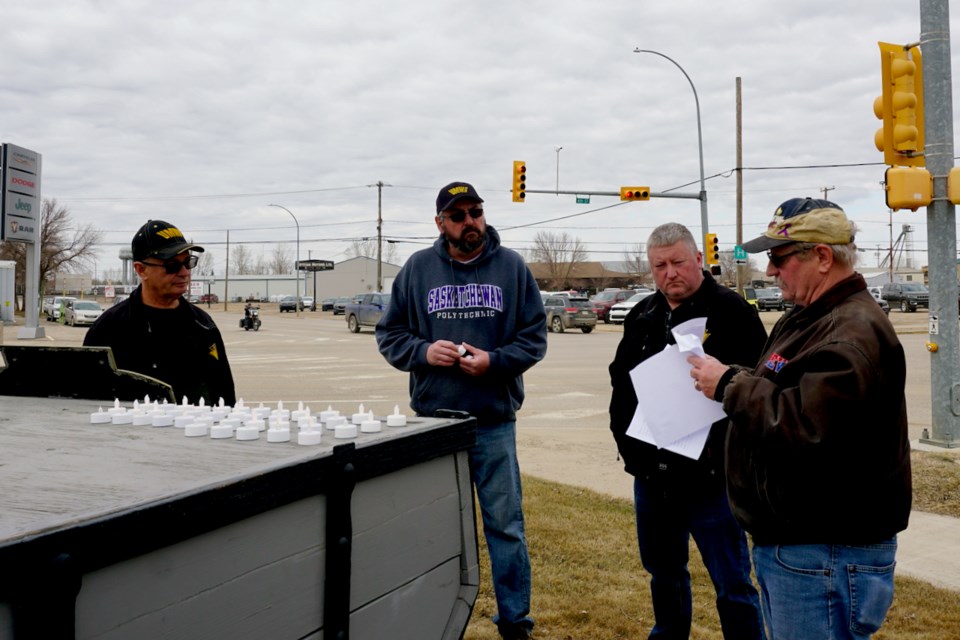ESTEVAN — Estevan marked the Day of Mourning on April 28.
United Mine Workers of America Local 7606 and International Brotherhood of Electrical Workers Local 2067 members gathered at the Coal Car memorial near the Estevan Court House on Friday to recognize and honour lives lost in Saskatchewan to workplace injuries and illnesses.
"Today is dedicated to remembering the 39 workers that have lost their lives, suffered injury or illness on the job or experienced a work-related tragedy. And it is also a day to renew our commitment to improve health and safety in the workplace and prevent further injuries, illnesses and deaths. We offer our thoughts and prayers to the families who live with the constant pain and grief day after day," said UMWA Local 7606 member Gary Malaryk.
This past year, 39 fatality claims were accepted by the Saskatchewan Workers' Compensation Board. Nine families requested the names to be withheld. The list of those being honoured included Hugh Smith, 64, of Winnipeg, who was working as a boilermaker and died due to asbestos exposure that occurred in Estevan. Another worker, age 69, who was working for Kingston Midstream Limited, died due to a heart attack in Estevan.
Darcy Wright, a retired IBEW Local 2067 member, read the names of workers that died due to workplace-related injuries or illnesses in 2022. Out of 39 work-related fatalities, four lives were lost due to firefighter cancer, one to COVID-19, one to exposure to harmful substances and environment, two died due to a fall, six didn't survive heart attacks, one died of medical complications. There also were 16 cases of mesothelioma, a rare cancer caused by asbestos exposure, and six motor vehicle accidents. One worker died after being struck by an object, and there also was one suicide. The latest was a police officer, 44, working out of Moose Jaw.
Candles were lit in memory of each person who suffered a workplace-related death last year.
"I wish we didn't even need these this day or these remarks," said UMWA Local 7606 member Ashley Johnson. "In an ideal world, the world the labour movement is building towards, nobody ever gets killed or injured simply because they went to work. But until then, it's important to gather and remember those we've lost, demand justice for and commit to making jobs safer for the living … It's in their memory that we find the strength to fight on.
“Fight to pressure our government and employers to get serious about job safety, fight to strengthen laws and regulations and to ensure they're enforced, fight to ensure victims of workplace fatalities and injuries have the support and care they need."
Johnson went on to say that one way to increase enforcement is to increase the repercussions and stated that there must be serious consequences for employers who break the laws, intended to keep their employees safe.
"Harsher penalties for the worst employers could make a difference, more fines, steeper fines and even jail time," Johnson said. "Penalties must be a deterrent, not just a speed bump. Killing a worker on the job must never be the cost of doing business. This must change. Saskatchewan is a dangerous place to be a worker, data and statistics prove it," Johnson said.
He noted that for a while, time-loss claims and injuries were on the decline, but now it's trending upwards again and they see workers being away from work longer with more severe injuries.
"We all need to do better, trade unions must be better, employers and governments must do better," Johnson said. "This year, I'd also like to take the opportunity to highlight the need for employers and government to do more to prevent workplace violence."
He noted the Saskatchewan Federation of Labour and advocates spent years fighting for mandatory workplace violence policies, and they have finally secured legislation for that. But there is still a need to continue advocating to ensure employers have workplace violence and harassment training in place, identify hazards and create action plans, and treat domestic violence as not a personal issue, but a workplace issue.
"Workers deserve a violence-free workplace and employers that are mandated to support those experiencing violence away from work as well. Governments also have to stop workplace harassment, expand and enforce whistleblower protection for those disclosing workplace violence and harassment, hire and train more safety officers, and recognize domestic violence as a workplace hazard," Johnson said.
"I won't deny, we have strong Occupational Health and Safety legislation in place only because workers have fought for it for over 50 years. We must not forget those three important worker rights: the right to know, the right to participate and the right to refuse. The power of our unity, our solidarity must be used to ensure workers go home safe after every shift."


